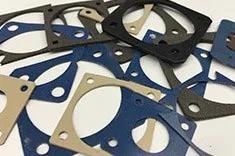EMI Shielding Products
- Custom Gasket Fabrication
- Connector Gaskets
- Bonded O Ring
- Custom Gaskets
- Conduct-O-Knit Knitted Wire Mesh
- Conduct-O-Seal Combo Gasket
- Conduct-O-Elastomer
- Conduct-O-Seal Oriented Wire in Silicone Gasket Material
- Conduct-O-Mesh Tape
- Conduct-O-Foam
- Conduct-O-Bond
- Optical Filters For Electronic Displays
- Shielded Vent Panels
- ESC Board Level Shielding
- 300 Series
Why Engineers Need to Know About EMI Shielding Effectiveness

Shielding EMI Effectiveness serves as a critical index for evaluating the performance of EMI shielding materials or apparatuses. This value quantifies how well a shield mitigates electromagnetic interference by comparing signal intensities before and after applying a shield.
In-Depth Exploration of EMI Shielding Effectiveness
Engineers must consider EMI Shielding Effectiveness to guarantee the consistent performance of electronic systems across sectors like healthcare and aerospace. This focus allows the precise selection of materials and designs that mitigate interference, preventing signal loss or system failure. By using attenuation metrics, they can meet industry standards and regulatory demands. East Coast Shielding's proven solutions offer the specific levels of effectiveness required to ensure device reliability and user safety.
Sources of EMI
Electromagnetic interference springs from two primary wellsprings: human-made and natural phenomena. Human-made sources encompass devices like smartphones, microwaves, and electrical grids, while natural sources include events such as lightning, solar flares, and geomagnetic storms. These EMI sources unleash their disruptive energies through two principal mechanisms: conduction and radiation. Conduction occurs when the signal courses along a metallic pathway, often within the same device, being disrupted. In contrast, radiation involves the wireless transit of electromagnetic waves, affecting devices remotely. For example, a lightning strike radiates EMI that could impair electronic systems miles away.
Evaluating EMI Shielding Effectiveness
To calculate EMI Shielding Effectiveness, experts use a metric known as attenuation. Attenuation measures the reduction of signal strength between two points: pre-shield and post-shield. Represented in decibels (dB), this provides a standardized way to quantify how well a shielding solution functions. The signal under scrutiny has an attribute known as amplitude, representing its intensity. By calculating the attenuation, one can precisely determine how much the shielding material or device has reduced this amplitude, thus providing a concrete measure of its effectiveness.
With East Coast Shielding, you can access an extensive range of EMI shielding solutions that are rigorously tested for optimal effectiveness, meeting the requirements of leading institutions and government bodies.
Related Reading
- What to Look for When Hiring EMI Shielding Experts?
Several considerations will help you get the best possible service and products when on the market for EMI shielding gasket manufacturers.
- How to Protect Against Narrow and Broadband EMI?
- What is EMI shielding tape?



